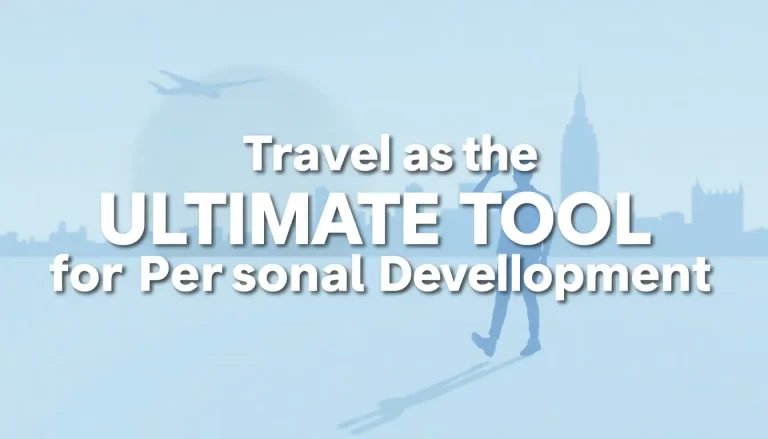Are you constantly daydreaming about distant lands and exotic adventures? Does the mere thought of exploring new cultures make your heart race? If so, you might just be a travel addict! Embracing this passion can lead to a lifetime of unforgettable experiences and personal growth. Let’s dive into the fascinating world of travel addiction and uncover the signs that you might have caught the bug.
Identifying the signs of a travel addiction
Travel addiction, often referred to as wanderlust, manifests in numerous ways. If you find yourself nodding along to any of the following, you may very well be a travel addict:
- Your conversations start with travel tales: If you’re always saying «When I was in…» followed by stories of your latest adventure, it’s a clear sign.
- Trip planning is a hobby: You enjoy planning trips, even if you don’t intend to take them. The thrill of dreaming counts just as much!
- Netflix is a travel guide: You’ve binge-watched every travel documentary and show available, absorbing knowledge and inspiration.
- Travel apps are your lifeline: Your phone is filled with travel-related apps, from currency converters to translation tools.
- Constantly asking about origins: You often inquire about others’ hometowns, regardless of their accents.
- Frequent flyer status: You’ve accumulated elite status with multiple airlines, making you a pro at navigating airports.
- Map decor: Your walls are adorned with maps instead of traditional art, showcasing your love for exploration.
Is it possible to be addicted to travel?
Yes, travel addiction is a real phenomenon. Just like any other passion, it can become an obsession that significantly influences your life. Many travelers experience a compulsive need to explore new destinations, often prioritizing travel over other commitments. This addiction can lead to both positive and negative outcomes, depending on how it’s managed.
On the positive side, travel addiction can lead to:
- Enhanced cultural understanding
- Personal growth and self-discovery
- Building lifelong friendships around the globe
However, it can also have downsides, such as:
- Financial strain from constant travel expenses
- Neglecting personal relationships
- Difficulty settling down or committing to one place
Understanding the obsession with travel
But what drives this obsession? For many, the allure of travel lies in the thrill of adventure and the promise of new experiences. Exploring unknown territories can be exhilarating, offering a break from the monotony of daily life.
Additionally, travel allows individuals to:
- Immerse themselves in diverse cultures
- Savor new cuisines and flavors
- Challenge themselves with new activities, like hiking or diving
These experiences foster a sense of freedom that is addictive. Each trip can feel like a new chapter in a never-ending story, keeping the wanderlust alive and strong.
The compulsive urge to travel
For some, the urge to travel becomes more than just a hobby; it morphs into a compulsion. This need can manifest in various ways, including:
- Frequent trips: You may find yourself traveling multiple times a year, regardless of your schedule.
- Planning future trips: Even while on a current trip, your mind races to the next destination.
- Budgeting for travel: You prioritize travel expenses in your budget, often sacrificing other luxuries.
This compulsive need to travel can often lead to feeling restless and anxious when grounded for too long. The excitement of packing a suitcase and heading to the airport can be a thrilling experience that many crave regularly.
Ways to sustain your travel passion without overwhelming yourself
While embracing your travel addiction, it’s essential to find balance and sustainability. Here are a few tips to keep your travel passion alive without causing stress:
- Set a travel budget: Allocate funds specifically for travel to manage expenses better.
- Plan shorter trips: Weekend getaways can satisfy your wanderlust without the commitment of long vacations.
- Combine work and travel: Consider remote work opportunities that allow you to explore new places while earning a living.
By incorporating these strategies, you can continue to indulge in your love for travel while maintaining a healthy lifestyle.
Connecting with fellow travel enthusiasts
Building a network of like-minded travelers can enhance your experiences. By sharing stories, tips, and advice, you create a community that thrives on mutual passions. Consider joining travel forums or social media groups dedicated to travel enthusiasts. This connection can lead to:
- Meeting travel buddies for future adventures
- Exchanging travel hacks and destination recommendations
- Finding inspiration for new places to explore
Connecting with others who share your passion can be incredibly rewarding and may lead to lifelong friendships.
Traveling as a form of self-care
Travel has profound benefits for mental health and well-being. Taking time off to explore different environments can provide a much-needed escape from daily stressors.
Some benefits of travel as self-care include:
- Reducing anxiety and promoting relaxation
- Boosting creativity through new experiences
- Improving overall happiness and life satisfaction
Utilizing travel as a form of self-care encourages you to prioritize your well-being while indulging in your passion.
Finding balance in your travel lifestyle
Ultimately, the key to managing your travel addiction lies in finding a balance. Embrace your passion for exploring the world, but also recognize the importance of stability in life. By combining your love for travel with responsible planning, you can create a fulfilling lifestyle that satisfies your wanderlust without overwhelming your daily routine.
So, if travel is your addiction, embrace it! After all, the world is vast and filled with experiences waiting for you to discover. Happy travels!







